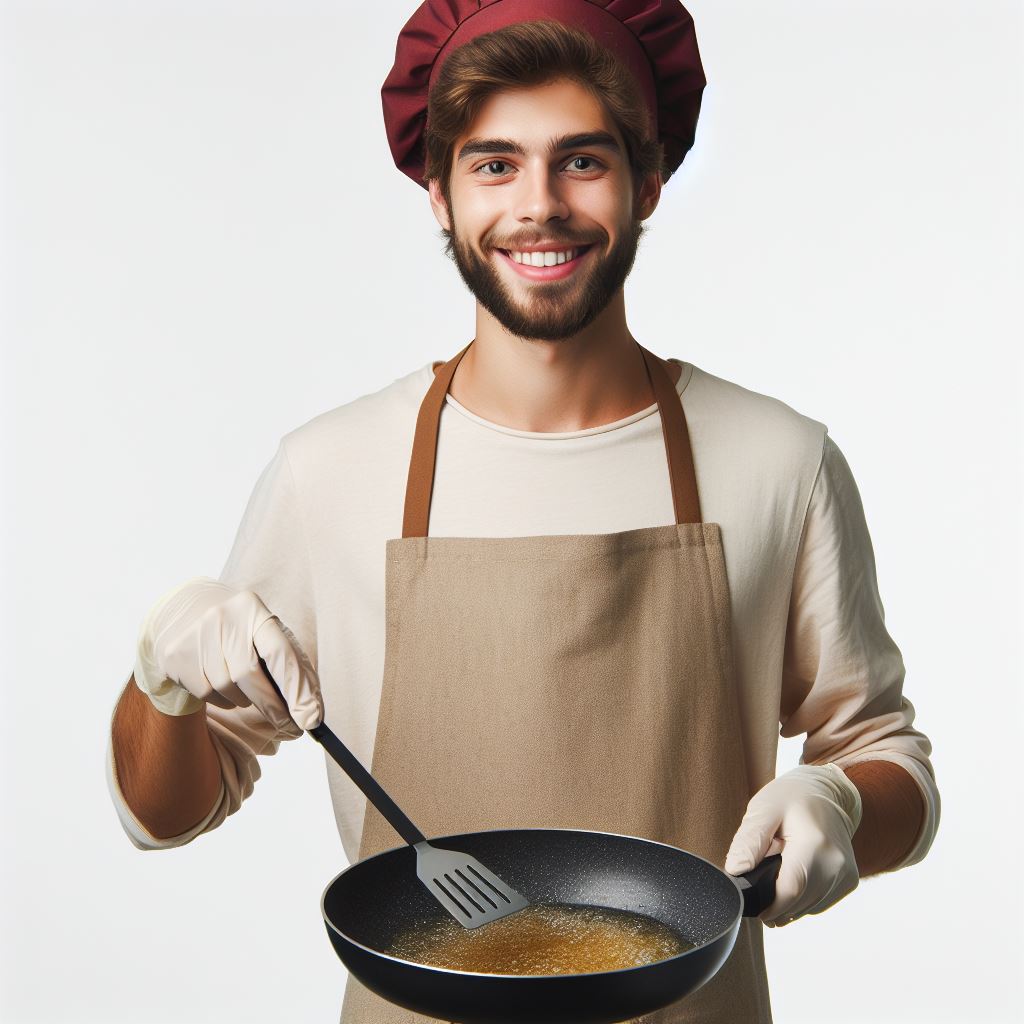When you heat oil over high heat, the temperature rises rapidly. If you don’t watch out, the oil could start to bubble. That’s because water molecules inside the oil begin to break apart, releasing steam. As the steam condenses back into liquid droplets, they create tiny bubbles. These bubbles expand at higher temperatures, causing the oil to foam.
Quick Overview
| Question | Answer |
|---|---|
| Q1: Why is my frying oil popping? | A1: Oil popping occurs when heating oil above 140 degrees Fahrenheit. As the oil temperature rises rapidly, water molecules inside the oil break apart, releasing steam, causing bubbles. |
| Q2: How can I prevent oil from popping? | A2: Various methods include using a deep fryer for even heating, a wok for better temperature control, a skillet for affordability, a stovetop burner for flexibility, or a pressure cooker for quick cooking. |
| Q3: How does cooking food slowly help? | A3: Starting with low heat and gradually increasing prevents oil popping. Especially for long-simmering dishes like stews, soups, or sauces, slow cooking maintains food texture. |
| Q4: How does adding garlic prevent popping? | A4: Adding garlic towards the end avoids burning as it contains sulfur compounds that burn easily. This preserves flavor without contributing to oil popping. |
| Q5: Why avoid overcrowding the pan? | A5: Overcrowding disrupts proper oil circulation, causing uneven cooking. Ensuring consistent temperature is crucial to preventing oil popping during frying. |
| Q6: What’s the role of pan size? | A6: Using the right size pan maintains consistent heat distribution. Large skillets work well for most foods, while smaller pans are better for delicate items, preventing oil popping. |
| Q7: How to control heat and prevent popping? | A7: Turning down the heat once food starts browning prevents oil popping. Excessive heat can burn the exterior while leaving the inside raw. |
Why is my frying oil popping?

Oil popping happens when you heat oil above 140 degrees Fahrenheit. If you don’t know how much oil to use, start with one tablespoon per pan. Once you’ve added enough oil to cover the bottom of the pan, wait about five minutes before adding food.
How To Keep Oil From Popping When Frying and Keep Grease from Splattering?
There are several ways to prevent oil from popping when frying and keeping grease from splattering. You might think you know how to do it, but there are actually many different methods.
Use a deep fryer
The most common method is to use a deep fryer. Deep fryers work well because they heat up quickly and evenly. They also allow you to cook food in small batches without having to constantly monitor the temperature.
However, deep fryers aren’t cheap. If you don’t want to spend $200-$300 on a deep fryer, you’ll have to find another way to make sure your food doesn’t burn.
Use a Wok
Another option is to use a wok. Woks are great because they’re inexpensive and easy to clean. Plus, they give you much better control over the temperature. But, like deep fryers, woks aren’t always practical.
For example, if you’re cooking something large, such as chicken wings, you won’t have enough room to fit everything into one wok.
If you don’t want to buy a wok, you can still use a skillet. Skillets are good because they’re relatively inexpensive. And, since skillets are usually made out of stainless steel, they’re easy to clean.
But, just like woks, skillets aren’t perfect. Because they’re shallow, they tend to heat unevenly. So, if you’re trying to cook something delicate, such as a fish fillet, you might end up burning it.
Use a Stovetop burner
To avoid these problems, you can try using a stovetop burner. These burners are designed to heat up evenly and quickly. They’re also very affordable. Plus, they’re easy to move around. So, if you need to switch positions during cooking, you can easily move the burner closer to where you need it.
Use a Pressure Cooker
You can also try using a pressure cooker. Pressure cookers are similar to slow cookers, except they’re used specifically for cooking food under high pressure. This allows you to cook food faster than traditional ovens. In addition, pressure cookers are easier to clean than slow cookers.
Cooking food Slowly
Another option is to cook your food slowly. Make sure that you do not overcook your food. If you are making a dish that requires long-simmering, such as stews, soups, or sauces, start with low heat and gradually increase the temperature. This will help prevent your food from becoming mushy.
Adding Garlic
You can add garlic towards the end of the cooking process. Garlic contains sulfur compounds that burn easily. By adding it toward the end of the cooking period, you can avoid burning the garlic.
Overcrowding the Pan
Another tip is to avoid overcrowding the pan. You want to keep the temperature consistent throughout the entire process. Overcrowding the pan causes hot spots where the oil doesn’t circulate properly. This leads to unevenly cooked foods.
Using the right size pan
Another thing to consider is the size of your pan. A large skillet works well for most foods, but smaller pans work better for delicate items such as fish fillets. If you want to go really small, try using a wok.
These are usually sold individually, but you can also buy sets of three or four. They’re great for stir-fries and other Asian dishes.
Controlling the Heat
Finally, remember to turn your heat down once the food starts browning. Browned food tastes great, but too much heat can cause the outside to burn while the inside stays raw.
Frequently Asked Questions (FAQs)
Q1: Why is my frying oil popping?
A1: Oil popping occurs when heating oil above 140 degrees Fahrenheit. As the oil temperature rises rapidly, water molecules inside the oil break apart, releasing steam, which condenses into liquid droplets, creating tiny bubbles that expand at higher temperatures, causing the oil to foam.
Q2: How can I prevent oil from popping when frying and avoid grease splattering?
A2: There are several methods to prevent oil from popping and grease from splattering:
- Use a deep fryer: Deep fryers heat up quickly, cook evenly, and are suitable for small batches.
- Use a Wok: Woks offer better temperature control, are inexpensive, and easy to clean.
- Use a Skillet: Skillets are relatively inexpensive, easy to clean, but may heat unevenly.
- Use a Stovetop Burner: Stovetop burners heat evenly, are affordable, and offer flexibility in positioning.
- Use a Pressure Cooker: Pressure cookers cook food quickly under high pressure, providing faster cooking times and easier cleaning.
Q3: How does cooking food slowly prevent oil popping?
A3: Cooking food slowly, especially dishes requiring long-simmering, prevents oil popping by starting with low heat and gradually increasing temperature. This method avoids overheating the oil and maintains food texture.
Q4: How does adding garlic help prevent oil popping?
A4: Adding garlic towards the end of the cooking process prevents oil popping as garlic contains sulfur compounds that burn easily. Adding it later avoids burning and retains the flavor.
Q5: Why should I avoid overcrowding the pan when frying?
A5: Overcrowding the pan creates hot spots, disrupting proper oil circulation and causing unevenly cooked food. To prevent oil popping, ensure consistent temperature throughout the cooking process.
Q6: What is the significance of using the right size pan in preventing oil popping?
A6: Using the right size pan, such as a large skillet for most foods or a smaller pan for delicate items, helps maintain consistent heat distribution, preventing oil popping and ensuring even cooking.
Q7: How do I control the heat to prevent oil popping?
A7: Controlling the heat involves turning it down once the food starts browning. While browned food adds flavor, excessive heat can cause the exterior to burn while the inside remains raw.
Conclusion
There are many different ways to prevent your oil from popping out. Some methods are more effective than others. However, all of them require some level of skill. With practice, you’ll be able to master any method. So, try the methods above and we are hopeful that this article will help you a lot.

Meet our air fryer recipe expert, Jenny J. Brown. Jenny is a culinary enthusiast with a passion for creating healthy, delicious meals using the latest kitchen appliances. As an experienced home cook and food blogger, Jenny has spent years experimenting with air fryer recipes and perfecting her techniques to create meals that are both nutritious and satisfying.

